
Charlotte Allen‘s response to my recent piece on the denial of accreditation for Ashford contains some good material, but some misunderstanding. My piece is not about whether the Ashford decision itself was flawed–I never stated that WASC was wrong to deny Ashford accreditation and flatly stated: “It is certainly possible that Ashford doesn’t deserve accreditation…” […]
Read More
The world of higher education is abuzz with the news that a for-profit university, Ashford University, whose Iowa campus holds accreditation from the North Central Association of Colleges and Schools, has been denied accreditation by the Western Association of Schools and Colleges (WASC) for its online headquarters. Denial of accreditation for schools that already have […]
Read More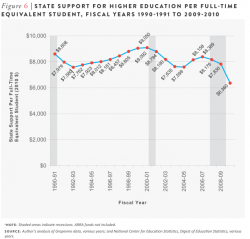
A new report from Demos, a policy and advocacy center, titled The Great Cost Shift: How Higher Education Cuts Undermine the Future Middle Class “examines how state disinvestment in public higher education over the past two decades has shifted costs to students and their families.”
Read More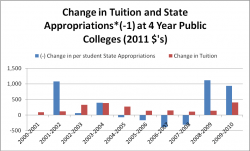
Gary Fethke’s recent op-ed Why Does Tuition Go Up? Because Taxpayer Support Goes Down in The Chronicle of Higher Education is an enjoyable read. Rather than dismiss the opposing side’s argument with straw men, as is so common these days, Fethke presents it faithfully and gives it due consideration, which is a breath of fresh […]
Read More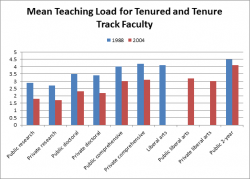
David C. Levy’s Washington Post article, “Do college professors work hard enough?” set off quite the firestorm. His basic point was that we currently “pay for teaching time of nine to fifteen hours per week for 30 weeks,” but that If the higher education community were to adjust its schedules and semester structure so that […]
Read More
Some commentaries on higher education appear year after year, almost unchanged. One of these hardy perennials is the story that tuition and fees don’t come close to paying for the actual cost of educating college students. In his popular book, The Economic Naturalist, Cornell University economist Robert Frank claims that tuition payments cover only a […]
Read More
Until recently, much talk about student loans was fact-free: There simply weren’t publicly available figures worth paying attention to. The official balance of student loans from the NY Fed were unreliable: There was a bucket of random obligations called “Miscellaneous”, which included things like utility bills, child support, and alimony. And it turns out that […]
Read More
What is the college graduation rate in this country? Correct answer: nobody knows. All the statistics you’ve read about are at best partial truths. We basically track graduation only for “traditional” students. The problem is that these “traditional” students are no longer representative – most college students are now “non-traditional”: 38 percent of students enroll […]
Read More
It’s called “the Bennett Hypothesis,” and it explains–or tries to explain–why the cost of college lies so tantalizingly out of reach for so many. In 1987, then Secretary of Education William J. Bennett launched a quarter century of debate by saying, in effect, “Federal aid doesn’t help; colleges and universities just cream off the extra […]
Read More
I’d like to respond to Peter Sacks’ critique of my new study. Something that I think is lacking from Sacks’ critique is any sort of acknowledgement of what the paper is about. So, for those that haven’t read it yet, here is the basic story of my report…
Read More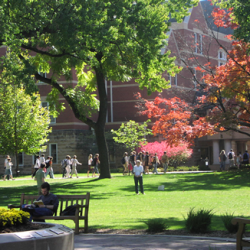
When individuals seek higher education, why should all of us have to pay? After all, individuals decide whether to seek a college degree based on their own calculations of expected costs and benefits. That taxpayers must bear the burden of financial aid to these individuals seems unfair. Given the billions of dollars governments pay individuals […]
Read More
The Income Based Repayment (IBR) program, which took effect in 2009, is designed to lighten the student-loan burden for some students. The basic idea is to limit monthly payments to less than 15% of disposable income. If a student makes these payments for 25 years, any remaining balance is forgiven, meaning that taxpayers essentially pay […]
Read More
By Andrew Gillen, Matthew Denhart, and Jonathan Robe As they defend tuition increases to irate students and parents, college and university leaders often argue that tuition does not cover their costs and that they are therefore subsidizing their students’ educations. Take, for example, what Southwestern College President Dick Merriman said in an October 2010 piece for The Chronicle of Higher […]
Read More
By Robert Martin and Andrew Gillen A popular notion within the academy is that teaching quality cannot be measured, but this is an article of faith, not a demonstrated fact. Very few institutions have made a systematic effort to measure teaching quality, largely because the faculty is opposed to it and administrators have little incentive […]
Read More
By Andrew Gillen and Robert Martin The annual release of Trends in Student Aid and Trends in College Pricing are big news in the higher education world, and rightly so. Since Department of Education data often take a year or two to become available, these reports provide the earliest and most comprehensive preliminary look at […]
Read More
On paper, accreditation is an amazing system. Among other things, it simultaneously advises colleges on how to improve, enforces a minimum level of quality, provides needed information to policy makers, and protects colleges from government intrusion. It does all this with only a few hundred employees, and a few thousand volunteers. Indeed if accreditation actually […]
Read More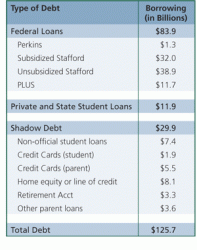
News that student loan debt, at $830 billion, exceeded credit card debt for the first time has sparked renewed interest in the financing of college and its implications for students. Largely ignored in the discussion, however, is the shadow debt, which consists of unorthodox methods of borrowing for college, including home equity loans and lines […]
Read More
Andrew Gillen of the Center for College Affordability and Productivity wrote this note to Charlotte Allen to clarify comments of his in Allen’s article today on student loans: Charlotte, I saw your article on student loans is up at Minding The Campus. I liked it, but at the very end, you have a long quote […]
Read More